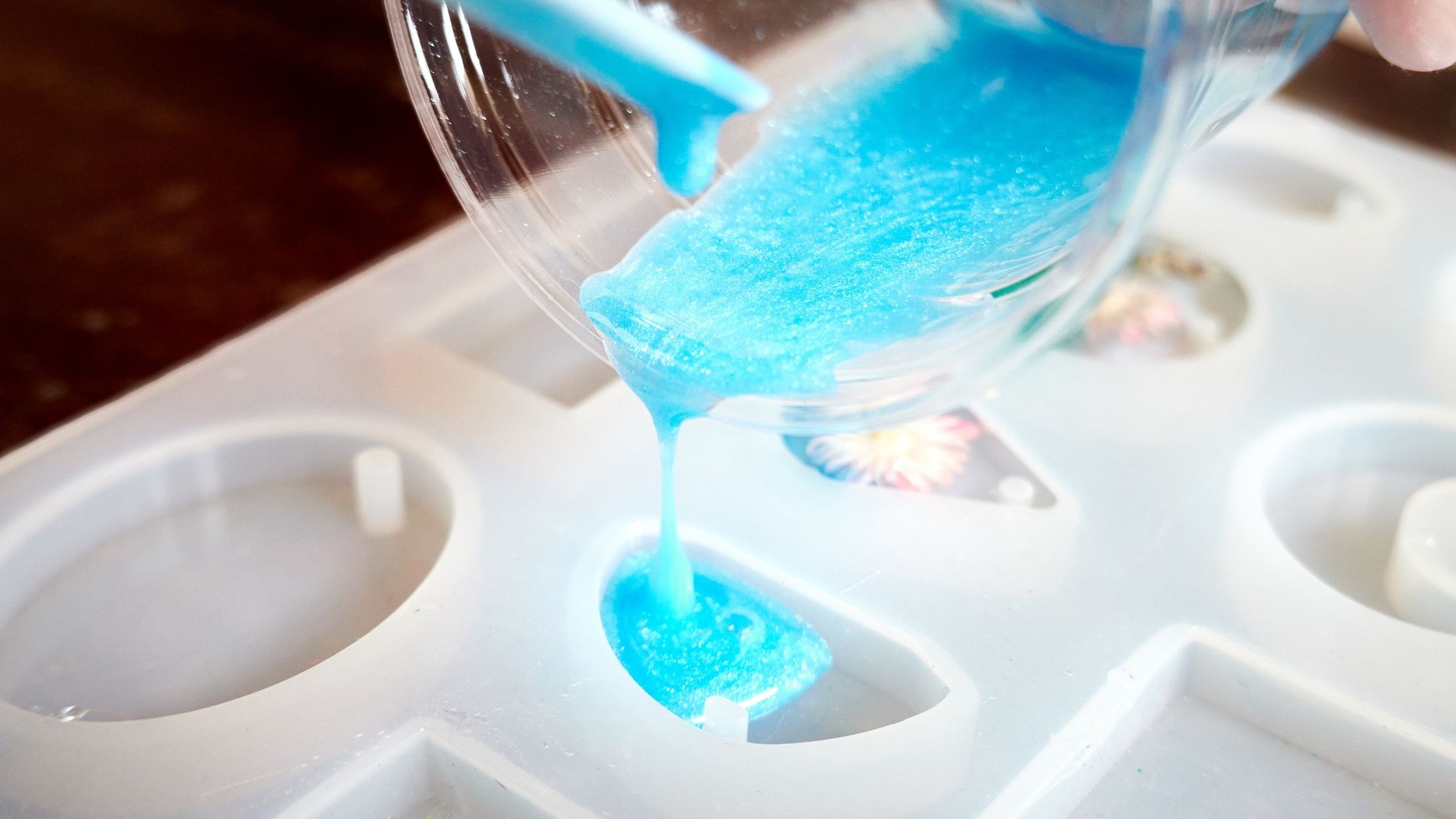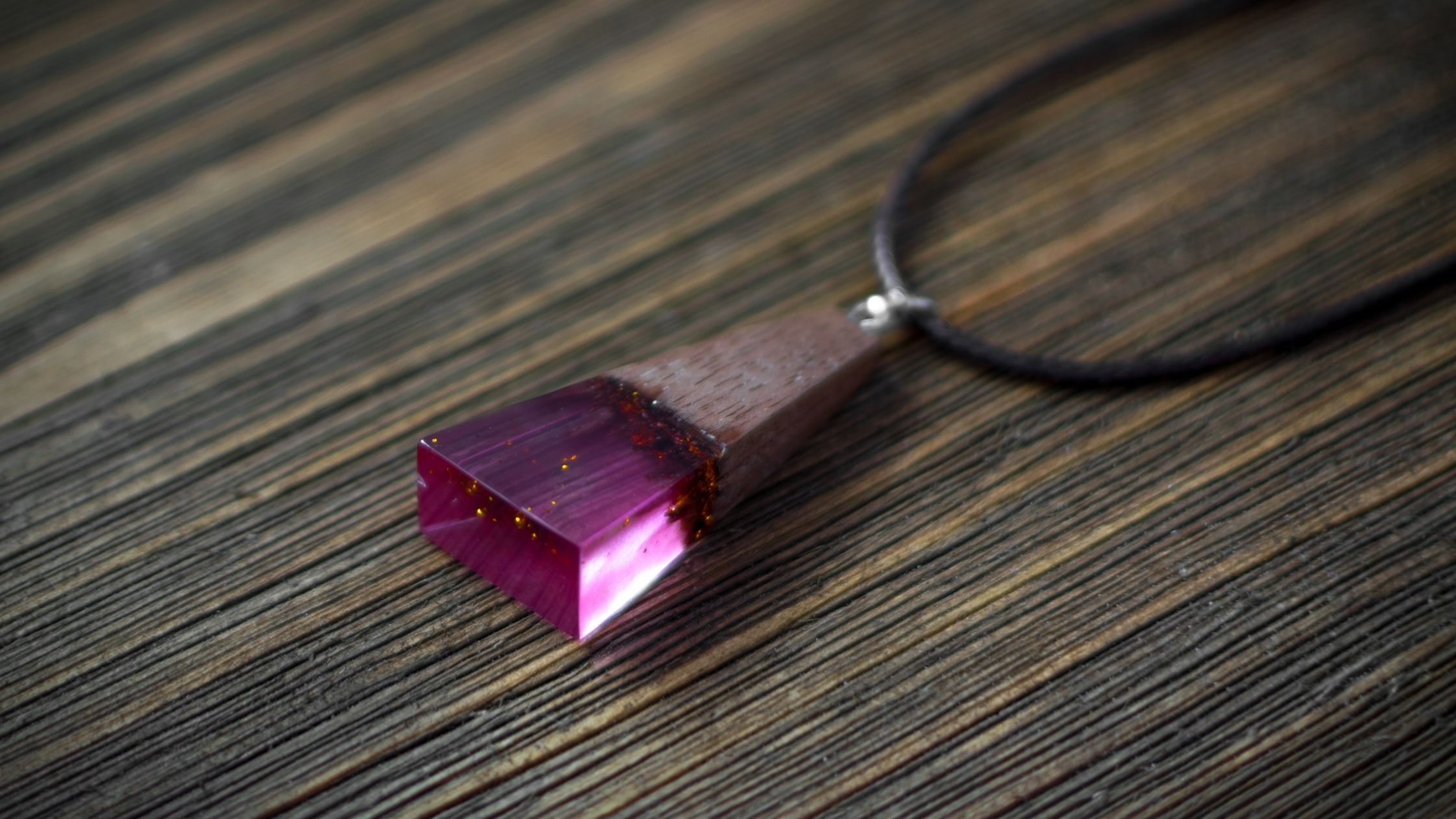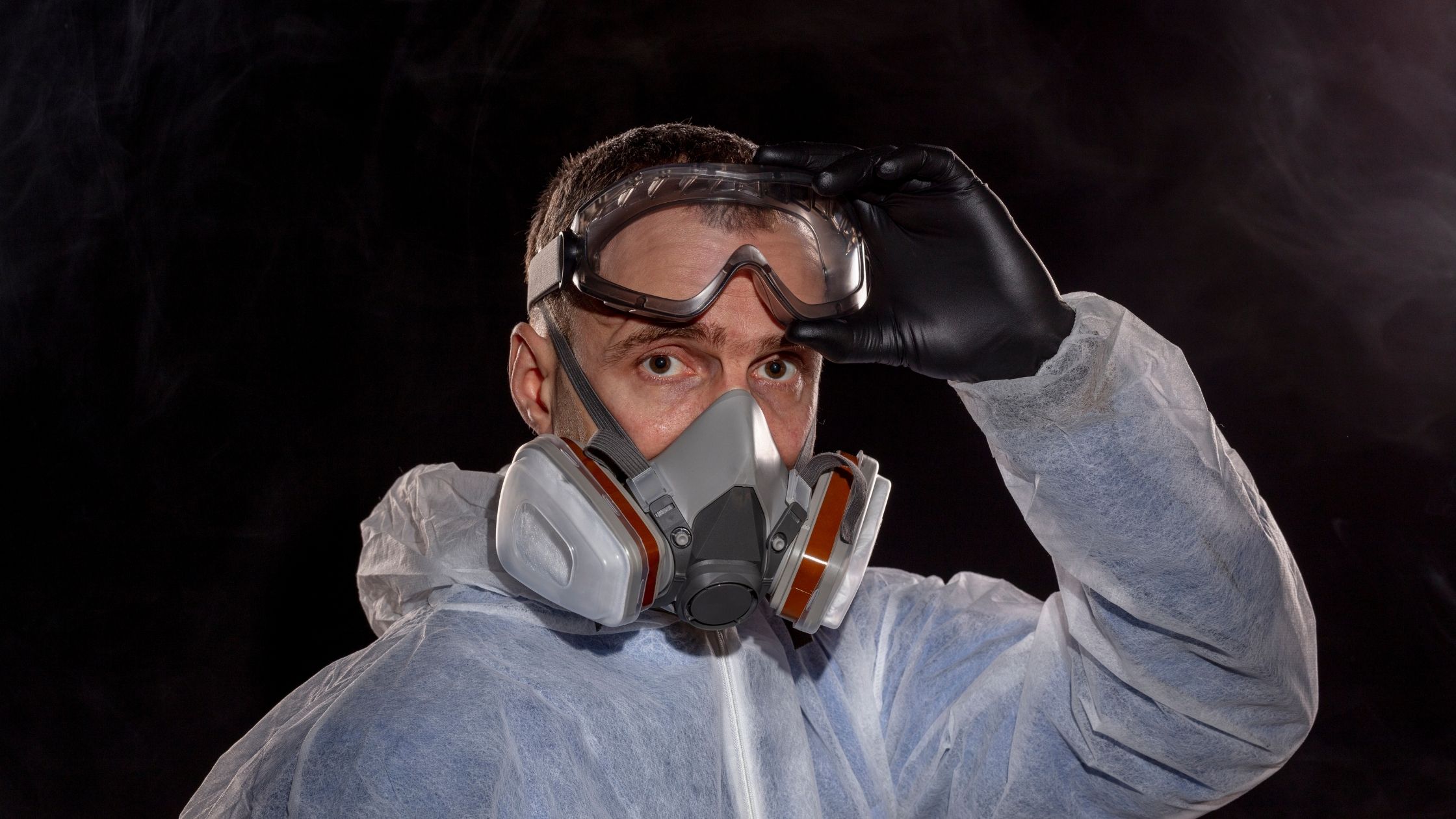If you’re into crafting, you’ve probably heard of epoxy resin. Maybe you’ve even worked with it. Is epoxy resin toxic though? The short answer is yes.
While epoxy can be super fun to work with, it is also important to be aware of the potential dangers that come with using it.

What Is Epoxy Resin?
There are a variety of different resins (some of which are completely natural and organic, like tree sap), but epoxy is one of the most commonly used by ordinary people like you and me, and it’s a synthetic resin.
Basically, epoxy is a synthetic polymer that cures when mixed with a hardener. It can be used for everything from gluing things together, to coating surfaces, filling in cracks, and even making things like tumblers.
What Is Epoxy Made Of?
Epoxy resin is formed from a chemical reaction between epichlorohydrin (ECH) and bisphenol-A (BPA).
What Is Epoxy Used For?
When you purchase epoxy at a craft or hardware store, it’s usually in a liquid state (it looks a lot like a thick clear glue), and when the liquid epoxy resin is properly cured with a hardener, it becomes a hard, durable material, which gives it excellent adhesion to build and repair boats and other watercraft, vehicles, and major structures.
It is also commonly used in the making of jewelry, furniture, and other smaller crafts.
Epoxy coatings are also used on artwork and concrete floors to create a durable, glossy finish.
Regardless of the use, when the epoxy is properly cured, it becomes a hard, durable material that’s also waterproof and heat resistant, which is what makes it ideal for such a huge variety of projects. It even has flame retardant properties.
As amazing as epoxy resin is though, it’s important to be aware of the potential dangers that come with using it.

Is Epoxy Resin Toxic?
Yes, uncured epoxy resin is toxic. Once it has properly cured, it is safe to touch. However, while it is in its liquid state, it can be harmful if ingested or if it comes into contact with your skin.
Unfortunately, you won’t always know if the epoxy is causing harm since the symptoms can take weeks or even months to develop. This is why it’s so important to take precautions when working with it. (Keep reading below to learn how to work with epoxy safely.)
When you work with epoxy resin, you are exposed to its fumes. These fumes can contain chemicals that can be harmful if they’re inhaled, and if you use epoxy without gloves or eye protection, it can cause skin irritation (sometimes severe, long-term skin irritation), allergic contact dermatitis, eye irritation, and other allergic reaction.
If you accidentally ingest epoxy, it can cause vomiting, diarrhea, and abdominal pain. In severe cases, it can lead to seizures and coma. If you think you have ingested epoxy resin, call your local poison control center or seek medical attention immediately.
Inhaling the fumes from epoxy can cause irritation to your throat and lungs and it can also damage your liver, kidneys, and reproductive organs.
This is why it’s important to wear protective equipment (including gloves, eye protection, and a proper mask) and take plenty of safety precautions when working with it.
Is Epoxy Resin Toxic To Breathe?
Yes, uncured epoxy resins are toxic to breathe. This is because it gives off fumes that can be harmful when inhaled.
This may seem surprising if you’ve worked with it before because it doesn’t have a super-strong odor. But when working with epoxy resin, it’s important to wear a mask and gloves and work in a well-ventilated area to avoid inhaling the fumes.
Is Resin Cancerous?
There is no definitive answer to this question because the research is still inconclusive. Some studies have found that resins can contain carcinogens, while other studies have not found a link between resin and cancer.
So, while we don’t know for sure if epoxy resin is cancerous, it is best to err on the side of caution and take steps to avoid exposure whenever possible.
Is Epoxy Resin Safe To Use Indoors?
It is not recommended to use epoxy resin indoors because of the fumes it gives off. If you do use it indoors, make sure to open all the windows and doors and use a fan to ventilate the area. And do not use it around your children or pets.
It’s also a good idea to avoid using epoxy resin in your kitchen because the fumes may contaminate your food.
There are many reports of long-term illnesses and skin reactions due to the improper use of epoxy resins.
This video from AuntieTay on YouTube gives a solid warning about using epoxy:
Is Epoxy Resin Harmful to The Environment?
Yes, epoxy resin can be harmful to the environment. When it’s not disposed of properly, it can leak into the ground and contaminate water sources.
It’s also important to note that epoxy resin is not biodegradable, so it can stay in the environment for a long time if it’s not disposed of properly.
How Do I Dispose of Epoxy?
The best way to dispose of epoxy is to take it to a hazardous waste facility. Do not put epoxy in your curbside bin because it will contaminate other materials and could harm waste workers.

Tips For Working With Epoxy Safely
Now that we’ve answered the question, “Is epoxy resin toxic?” let’s talk about how to use it safely.
You can also check your epoxy’s safety data sheets to learn more about the proper safety precautions you should take when using epoxy.
Wear A Mask & Safety Equipment
The first and most important tip is to wear a mask and safety equipment when you’re working with liquid epoxy resin. I know it may feel a little silly to walk around in protective gear when you’re doing a seemingly simple craft project, but this will help protect you from the fumes that epoxy resin gives off.
You should also wear nitrile gloves and safety goggles to avoid skin contact with epoxy. As I mentioned earlier, epoxy can cause severe allergic contact dermatitis and skin and respiratory irritation.
Work in a Well-Ventilated Area
It’s important to work in a well-ventilated area when using epoxy resin. This will help to avoid inhaling the fumes.
If you’re working indoors, open all the windows and doors and use a fan to ventilate the area.
Don’t Eat Or Drink Around It
It’s also important not to eat or drink around epoxy resin. The fumes can contaminate your food and water, and if you accidentally get the resin on your skin, it can be harmful if ingested.
Keep It Away From Children and Pets
Epoxy resin is not safe for children or pets, so it’s important to keep it away from them. If you’re using it indoors (in a well-ventilated area!), make sure to keep them away – preferably outside.
Your kids can help you with other craft projects. Check out our list of non-toxic glue for kids and safe paint for kids too.
Avoid Using Epoxy Products In The Kitchen
Whatever craft you’re making, I wouldn’t recommend making anything that you plan to use in the kitchen. Even once the epoxy is dry and cured, the fumes can still linger when it touches something hot (like coffee), pieces can break off, and it’s just not worth the risk.
Do You Need To Wear A Mask When Working With Epoxy?
If you’re working with epoxy resin, it’s important to wear a mask to avoid inhaling the fumes.
Can I Use A N95 Mask For Resin?
No, you cannot use a N95 mask for resin. N95 masks are designed to filter out 95% of particles that are larger than 0.3 microns, but the toxic chemicals from epoxy resin fumes are much smaller than that.
So, while an N95 mask might help reduce the amount of fumes you’re inhaling, it’s not going to filter out all of them.
Are Epoxy Floors Toxic?
If you’re worried about the epoxy on your floors at home, don’t be. Once the epoxy has properly cured, it’s not toxic.
Is Resin Toxic When Dry?
No, resin is not toxic when dry because the chemicals that make it up are no longer volatile.
Is There A Non-Toxic Epoxy?
The term “non-toxic” is fairly unregulated in the U.S., and unfortunately, there is no such thing as an entirely non-toxic epoxy because all epoxies contain toxic chemicals that can be harmful if used incorrectly. However, there are low-toxicity epoxies that release fewer fumes and have fewer harmful chemicals than others.
Is There A Safer Alternative To Epoxy?
There are some safer alternatives to epoxy, such as polyurethane and silicone. These materials are not as strong as epoxy, but they’re less likely to cause health problems.




